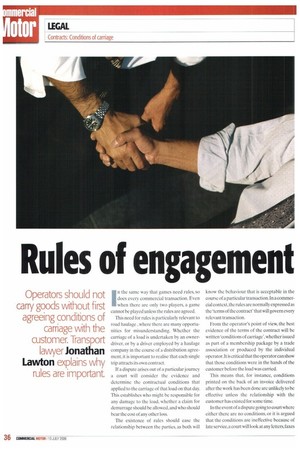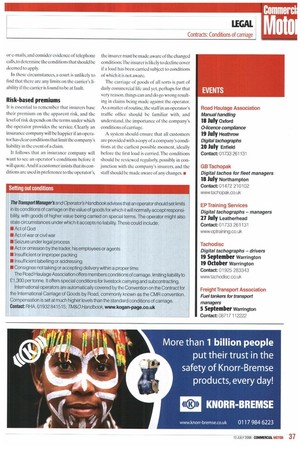Rules of engagement
Page 36

Page 37

If you've noticed an error in this article please click here to report it so we can fix it.
Operators should not
carry goods without first agreeing conditions of
carriage with the
customer. Transport lamer Jonathan Lawton explains why rules are important In the same way that games need rules, so does every commercial transaction. Even when there are only two players, a game cannot be played unless the rules are agreed.
This need for rules is particularly relevant to road haulage , where there are many opportunities for misunderstanding. Whether the carriage of a load is undertaken by an ownerdriver, or by a driver employed by a haulage company in the course of a distribution agreement, it is important to realise that each single trip attracts its own contract.
If a dispute arises out of a particular journey a court will consider the evidence and determine the contractual conditions that applied to the carriage of that load on that day. This establishes who might be responsible for any damage to the load, whether a claim for demurrage should be allowed, and who should bear the cost of any other loss.
The existence of rules should ease the relationship between the parties, as both will know the behaviour that is acceptable in the course of a particular transaction. In a commercial context, the rules are normally expressed as the 'terms of the contract' that will govern every relevant transaction.
From the operator's point of view, the best evidence of the terms of the contract will be written 'conditions of carriage', whether issued as part of a membership package by a trade association or produced by the individual operator. It is critical that the operator can show that those conditions were in the hands of the customer before the load was carried.
This means that, for instance, conditions printed on the back of an invoice delivered after the work has been done are unlikely to be effective unless the relationship with the customer has existed for some time.
In the event of a dispute going to court where either there are no conditions, or it is argued that the conditions are ineffective because of late service, a court will look at any letters, faxes or e-mails, and consider evidence of telephone calls,to determine the conditions that should be deemed to apply.
In these circumstances, a court is unlikely to find that there are any limits on the carrier's liability if the carrier is found to he at fault.
Risk-based premiums
It is essential to remember that insurers base their premium on the apparent risk, and the level of risk depends on the terms under which the operator provides the service. Clearly an insurance company will be happier if an operator has clear conditions that limit the company's liability in the event of a claim.
It follows that an insurance company will want to see an operator's conditions before it will quote. And if a customer insists that its conditions are used in preference to the operator's, the insurer must be made aware of the changed conditions.The insurer is likely to decline cover if a load has been carried subject to conditions of wh ich it is not aware.
The carriage of goods of all sorts is part of daily commercial life and yet, perhaps for that very reason, things can and do go wrong resulting in claims being made against the operator. As a matter of routine, the staff in an operator's traffic office should be familiar with, and understand, the importance of the company's conditions of carriage.
A system should ensure that all customers are provided with a copy of a company's conditions at the earliest possible moment, ideally before the first load is carried. The conditions should be reviewed regularly, possibly in conjunction with the company's insurers, and the staff should be made aware of any changes. •
































































































































































































